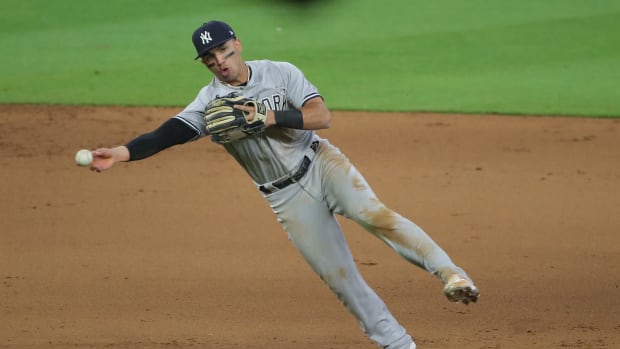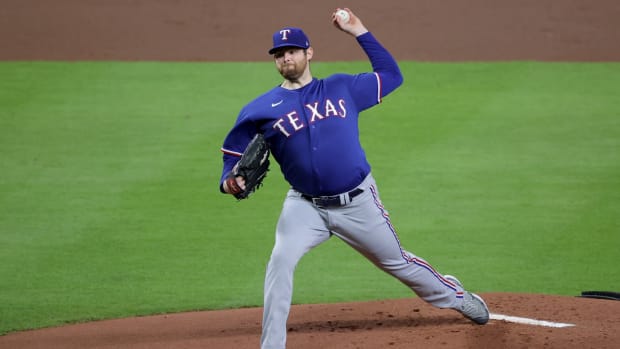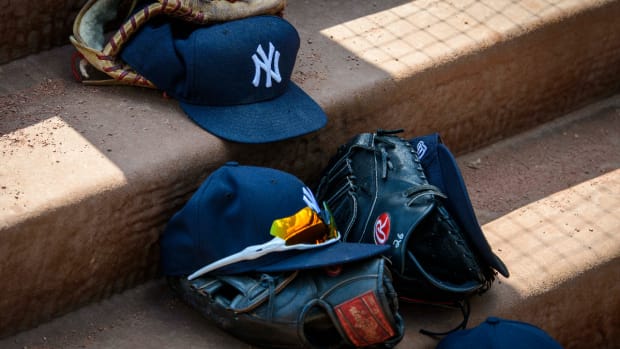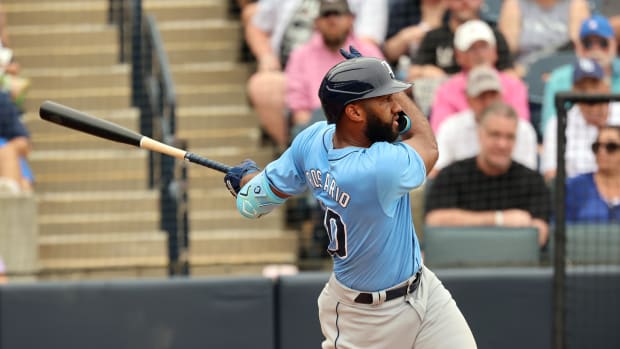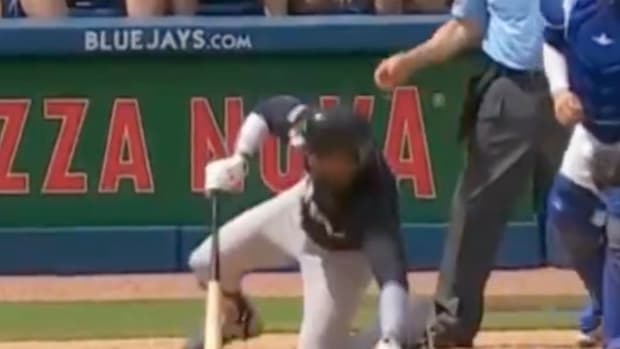Revisiting the Race For 2017 American League Most Valuable Player
Aaron Judge's rookie season in 2017 was, simply put, historic.
The Yankees' right fielder set a new record for home runs by a rookie in a single season, with 52, exceeding all expectations as a face-of-the-franchise type player in the Bronx. He was the unanimous selection for AL Rookie of the Year -- a catalyst in New York's high-powered lineup that came one win away from a World Series appearance.
And yet, Judge was blown away in the race for the league's Most Valuable Player, receiving just two first-place votes.
The winner of the 2017 AL MVP, Jose Altuve, also had a tremendous season. He led the league in several offensive categories, guiding the Astros to 101 wins in the regular season (third-best in all of baseball).
It was always fun for fans of each franchise to debate who deserved the Most Valuable Player Award more from that season, as it is every year. Just a few months ago, Mike Trout narrowly edged out Altuve's teammate Alex Bregman for the Award by just four first-place votes -- a hot topic around baseball leading up to and following the announcement. This week, however, a discussion as to who had the better year in 2017 has taken on a new meaning.
Major League Baseball's investigation on the Astros' sign-stealing scandal was released on Monday -- a report that confirmed allegations of Houston using covert cameras to illegally decipher opponent's signs throughout both the regular season and playoffs. The signs were then communicated from a player or team employee -- watching a monitor in the tunnel behind Houston's home dugout -- to the batter by banging on a trash can.
As a result of the investigation's findings, both Astros' manager A.J. Hinch and general manager Jeff Luhnow were handed down one-year suspensions from Commissioner Robert D. Manfred, Jr. The organization was also fined $5 million and stripped of draft picks from the first and second rounds for each of the next two years.
Subsequently, skippers Alex Cora and Carlos Beltran were let go by the Red Sox and Mets respectively due to their involvement in the scandal. Beltran was the lone player listed on Commissioner Manfred's report, while Cora was the Astros' bench coach and is also under investigation for electronically stealing signs as manager in Boston the following year.
The news of Houston's sign-stealing scheme has exploded the past few days, resulting in everything from scheduling trash can giveaways at a minor-league game to speculation surfacing on social media surrounding the Astros using buzzers or some sort of electronic technology in the 2019 season to signal to hitters which pitch was coming.
WATCH: Astros' sign-stealing scandal works out magnificently for the New York Yankees
From an investigation proving wrongdoing, to hearsay and rumors on the internet, the bottom line is that Houston's players were found guilty of taking an illegal competitive advantage in 2017. Therefore, each and every offensive performance by those in an Astros uniform over the course of that campaign are worthy of a second look. Included in that discussion, of course, is Jose Altuve.
Altuve led all of baseball in 2017 with an astounding .346 batting average. His 204 hits were tops in the American League, while the second baseman set new career highs in home runs (24), OBP (.410), SLG (.547) and OPS (.957).
Even for Altuve's standards -- who had already appeared in five All-Star Games over the first seven years of his career -- his performance in 2017 was stellar. But how did it compare to Judge and his first full season in the big league?
The 6-foot-7 right fielder had the epitome of a breakout season. Setting the new (temporary) single-season rookie home run record was just one of the impressive offensive feats that Judge compiled from Opening Day through Game 162.
In fact, Judge's 2017 performance as New York's right fielder earned him a spot on the Yankees' 2010s All-Decade Team.
Before diving deeper, take a look at where the two stacked up against each other statistically in 2017 -- mind you, they both made the All-Star Game, both led their teams to the postseason and both spent the vast majority of the season hitting in the third spot in their club's lineups.
| Jose Altuve | Aaron Judge | |
|---|---|---|
WAR | 8.1 | 8.1 |
Games Played | 153 | 155 |
BA | .346 | .284 |
OBP | .410 | .422 |
SLG | .547 | .627 |
OPS | .957 | 1.049 |
HR | 24 | 52 |
RBI | 81 | 114 |
R | 112 | 128 |
Based on those numbers, it sure seems like Judge had the better season, right? The only department in which Altuve produced superior numbers, besides a tie in WAR, was batting average.
Wins above replacement has been a decisive factor in recent MVP races. Beyond Trout edging out Bregman this past season (Trout had a 0.1 lower WAR), the last time a player was recognized as his league's Most Valuable Player and didn't lead his respective league in WAR was Josh Donaldson in 2015 -- Trout came in second that season despite 0.9 more wins above replacement.
In the case of 2017, Judge and Altuve both had 8.1. Shouldn't that warrant a closer tally of first-place votes?
From here on out, with basic offensive stats in mind, it's about even. For instance, Altuve stole far more bases (32 to Judge's nine swiped bags) while the Baby Bomber had over ten more extra base hits than the Venezuelan (79 to Altuve's 67). It's possible that Judge's 208 strikeouts (most in all of baseball in 2017) hurt his resume, but then again, he led the American League in walks and finished second in on-base percentage -- Altuve struck out far less (84 slow walks back to the dugout) but got on base less.
When it comes to Statcast, while Judge was setting milestones in 2017, Altuve was nothing short of average.
| Jose Altuve (league ranking per category) | Aaron Judge (league ranking per category) | |
|---|---|---|
Batted Ball Event | 511 (13) | 338 (147) |
Average Exit Velocity (MPH) | 85.5 (T-318) | 94.9 (1) |
Max Exit Velocity (MPH) | 109.1 (T-249) | 121.1 (2) |
Number of Barrels | 34 (T-62) | 87 (1) |
Barrels/Plate Appearance | 5.1% (T-143) | 12.8% (1) |
Sure, exit velocity doesn't directly correlate to MVP votes, but the members of the BBWAA must take a comprehensive approach, encompassing all statistical categories, en route to making their decisions.
Each voter evidently has their own way of voting for individual awards. The fact of the matter, however, is that this race was a landslide -- Judge had 126 fewer vote points than Altuve.
This week, that final tally seems even more unjust. There's no way, as of now, to know just how much each individual member of the 2017 Astros cheated -- it's impossible to quantify the sign stealing's affect on different player's numbers. Nonetheless, Jose Altuve's home and road splits from his MVP season are worth noting.
In what was categorized by the Commissioner's Office as a "player-driven and player-executed" sign-stealing scheme, Altuve was less effective in games at Minute Maid Park, compared to contests on the road. In 296 at bats (over 78 games) the second baseman hit .311 with 52 strike outs -- in 294 at bats away from Houston (75 games played) Altuve hit .381 with 20 fewer punch outs.
If Altuve was one of the players to have participated in this sign-stealing scheme, knowing which pitches were coming ahead of time in contests played at Minute Maid Park, then why was he a far better hitter on the road? At first glance, you'd think a home field advantage, even without cheating, would lead to superior production -- in games at Yankee Stadium in 2017, Judge added almost 60 points to his season batting average and crushed 13 more home runs.
As more information is released, in the near and distant future, it may end up being easier to understand how the Astros' sign-stealing fiasco impacted Altuve's 2017 performance. On Thursday, in response to speculation on social media, Altuve denied using a wearable electronic aid under his jersey to steal signs -- his agent, Scott Boras, told Sports Illustrated's Tom Verducci that his client "has never worn any electronic device. Ever.”
Does that leave the door open for Altuve's involvement with the trash can banging scheme? Or was his MVP-worthy performance in 2017 clean?
Either way, with these numbers in mind, it's clear the race for AL Most Valuable Player in 2017 should have at least been a whole lot tighter.
To keep up with all of Yankee Maven's coverage, click the "follow" button at the top righthand corner of this page. For more from Max Goodman, follow him on Twitter @MaxTGoodman
